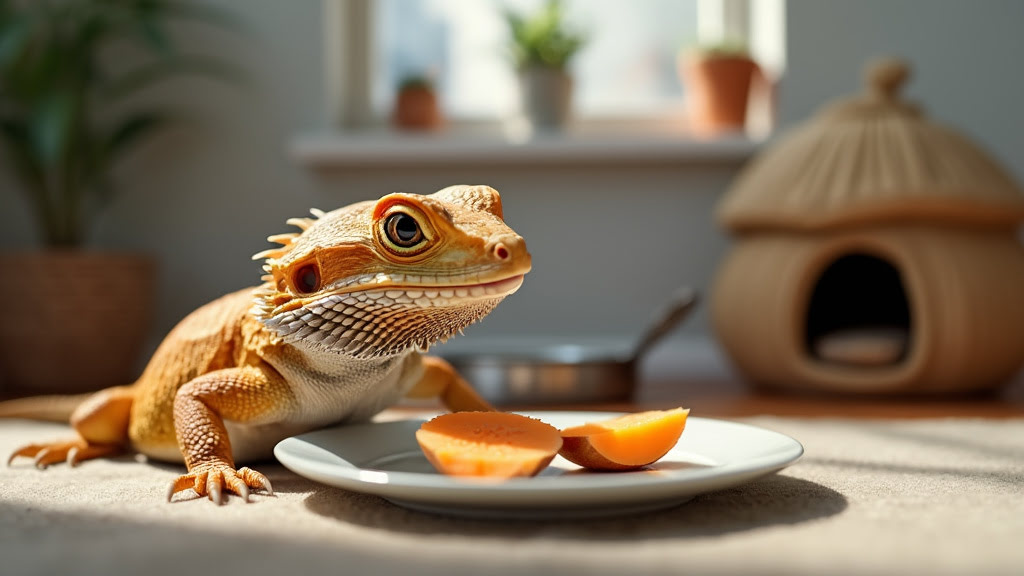If you’ve ever seen the wide-eyed, curious look your bearded dragon gives when you offer a new type of food, you know how fun it can be to explore their likes and dislikes. The first time I gave my bearded dragon, Draco, a piece of sweet potato, he tilted his head and gave it a cautious lick before diving in. This made me wonder: Are sweet potatoes a safe and nutritious food choice for bearded dragons? Let’s find out.
Nutritional Value of Sweet Potatoes
Sweet potatoes are often praised for their health benefits for humans, but what about for our reptilian pets? Here are some key nutrients found in sweet potatoes:
- Vitamins: Sweet potatoes have lots of Vitamins A, C, and B6. Vitamin A is good for eye health, Vitamin C boosts the immune system, and Vitamin B6 helps with metabolism.
- Minerals: They contain calcium and potassium too. Calcium is important for bones, and potassium helps with fluid balance and nerve function.
- Fiber: The fiber content helps with digestion, which is very important for a bearded dragon’s health.
Compared to other vegetables like kale or collard greens, sweet potatoes have more Vitamin A but less calcium. So, they should be added to the diet but not replace leafy greens.
Benefits of Sweet Potatoes for Bearded Dragons
Digestive Health
The fiber in sweet potatoes can help with digestion, preventing constipation and supporting a healthy gut.
Eye and Skin Health
Vitamin A is very good for a bearded dragon’s eyes and skin. But be careful because too much Vitamin A can be harmful, especially if they are also getting vitamin supplements.
Energy
Sweet potatoes are a good source of carbohydrates, giving your bearded dragon the energy it needs for its active life.
Risks and Considerations
Vitamin A Toxicity
One risk is the potential for Vitamin A toxicity if your bearded dragon gets too much. Symptoms include swelling, tiredness, and loss of appetite. Always talk to your vet if you see any problems.
Oxalates and Calcium Absorption
Sweet potatoes have oxalates, which can interfere with calcium absorption. Over time, this could lead to metabolic bone disease if not balanced with a diet rich in calcium.
How to Prepare Sweet Potatoes for Your Bearded Dragon
Buying and Storing Sweet Potatoes
Buy sweet potatoes that are firm and don’t have any blemishes or sprouts. Store them in a cool, dark place to keep them fresh longer.
Preparation Methods
Cooking vs. Raw: While bearded dragons can eat raw sweet potatoes, cooking them (steaming or baking) makes them easier to digest. Steam or bake until soft, then let them cool before serving.
Cutting: Always cut the sweet potato into small pieces to prevent choking. Safety first!
Serving Size
Like all treats, moderation is key. Offer small amounts of sweet potato, about a teaspoon, 1-2 times a week. This way you can see how they react and adjust as needed.
Monitoring Your Bearded Dragon’s Health
Behavioural Signs of Nutritional Issues
Watch for signs of nutritional imbalance like tiredness, swelling, or less appetite. You might be giving too much sweet potato or Vitamin A-rich foods.
General Health Tips
Regular vet check-ups are important for your bearded dragon’s health. Don’t rely only on home observations—some health issues need a professional
Personal Experience
Once, I noticed Draco scratching his eyes more often. After a vet visit, we found out he had mild Vitamin A toxicity from too many sweet potatoes. It was a good lesson in moderation and keeping a balanced diet.
Conclusion
Sweet potatoes can be a nutritious and tasty treat for your bearded dragon when fed in moderation. They have lots of vitamins, minerals, and fiber, but can cause Vitamin A toxicity and calcium absorption issues. Always aim for a balanced diet and keep an eye on your dragon’s health.
We suggest gradually introducing sweet potatoes into your bearded dragon’s diet and observing how they react. Feel free to share your experiences or ask questions in the comments below. We’d love to hear from you!
Additional Resources
For more about bearded dragon nutrition and diet tips, check out our other articles. Download our printable guide for serving suggestions and handy tips for a balanced diet for your scaly friend.
Author Bio
Hi! I’m a big fan of exotic pets and run Dug’s Bugs. My time with bearded dragons, especially Draco, has taught me a lot, and I’m here to share those lessons with you. Feel free to reach out if you have questions or need advice!
Disclosure
While I love sharing my experiences and knowledge, always refer to a vet for specific health concerns. Happy feeding!




